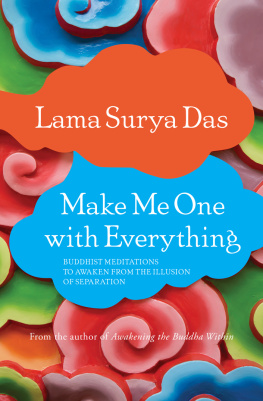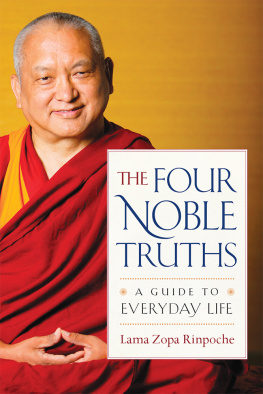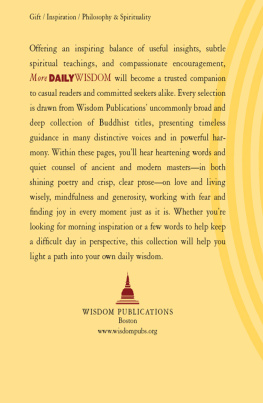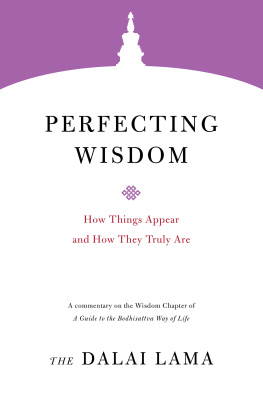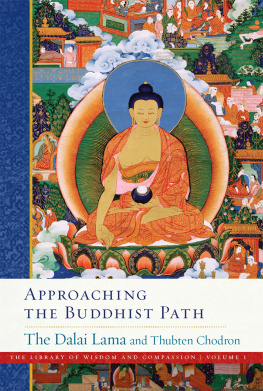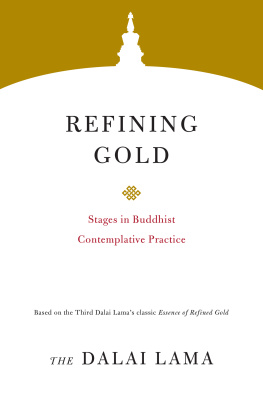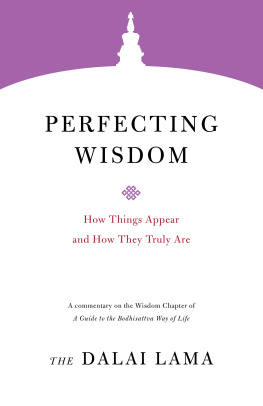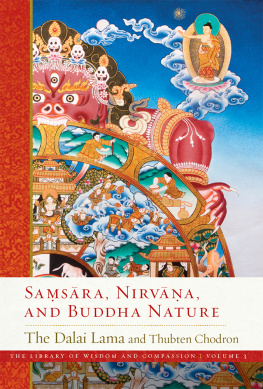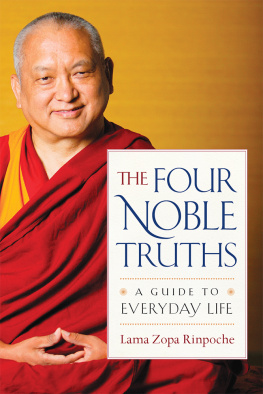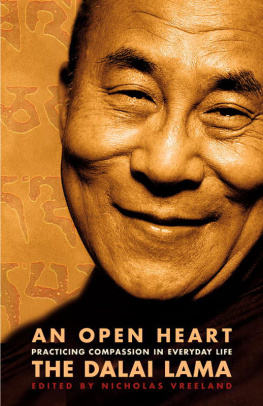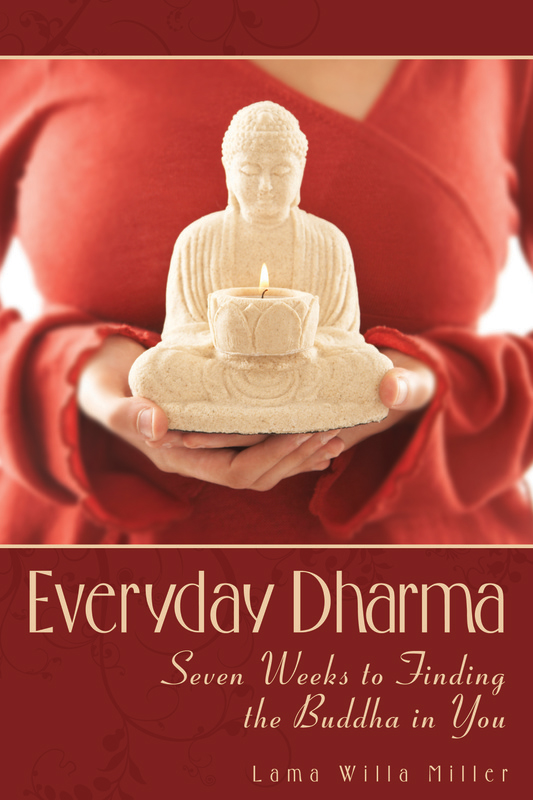

Everyday Dharma
Seven Weeks to Finding the Buddha in You
Lama Willa Miller

Learn more about Lama Willa Miller and her work at www.naturaldharma.org
Find more books like this at www.questbooks.net
Copyright 2009 by Lama Willa Miller
First Quest Edition, 2009
Quest Books
Theosophical Publishing House
P. O. Box 270
Wheaton, IL 60187-0270
Without limiting the rights under copyright reserved above, no part of this publication may be reproduced, stored in or introduced into a retrieval system, or transmitted, in any form, or by any means (electronic, mechanical, photocopying, recording, or otherwise), without the prior written permission of the publisher of this book.
The scanning, uploading, and distribution of this book via the Internet or via any other means without the permission of the publisher is illegal and punishable by law. Please purchase only authorized electronic editions, and do not participate in or encourage electronic piracy of copyrighted materials.
While the author has made every effort to provide accurate telephone numbers and Internet addresses at the time of publication, neither the publisher nor the author assumes any responsibility for errors or for changes that occur after publication. Further, the publisher does not have any control over and does not assume any responsibility for author or third-party websites or their content.
Cover image by Trinette Reed/Getty Images
Cover design by Kirsten Hansen Pott
Library of Congress Cataloging-in-Publication Data
Miller, Willa.
Everyday dharma: seven weeks to finding the Buddha in you / Lama Willa Miller.
p. cm.
ISBN 978-0-8356-0883-1
1. Spiritual lifeBuddhism. I. Title.
BQ5660.M54 2009
ISBN for electronic edition, e-pub format: 978-0-8356-2027-7
5 4 3 2 1 * 09 10 11 12 13 14
This book is dedicated to the Sage in you.
Truth is what stands the test of experience.
Albert Einstein
To see things in the seed is genius.
Lao Tzu
CONTENTS
Acknowledgments
F rom the point of view of the Buddhas teachings on interdependence, acknowledgments are due to every living being, and from the point of view of a spiritual practitioner, gratitude should be boundless. So the following is just a tiny portion of the thanks due to the many people who have helped contribute to this book directly and indirectly.
Dharma students, friends, and family members contributed to this project indirectly by asking many good questions and nudging me in the direction of simplicationfor them I am thankful.
I am deeply grateful to my literary agent, John White, for catching on to the books vision from the beginning.
I would like to thank from my heart the people who read and commented on the manuscript for Everyday Dharma in its various versions: John Makransky, Lama Surya Das, Leah Weiss, Jane Moss, Julie Forsythe, John and Linda Dean, and Jill Stockwell. I am especially indebted to those at Quest Books who helped make the book a reality: publishing manager Sharron Dorr, publicist Xochi Adame, and editors Richard Smoley and Judith Stein, whose comments throughout made this a better book and who offered support, advice, and encouragement during the editing process.
A deep bow of gratitude to my root teachers who are the contributors behind the book: Kalu Rinpoche, Dilgo Khentse Rinpoche, Bokar Rinpoche, Lama Norlha Rinpoche, and Khenpo Tsultrim Gyatso Rinpoche. I would also like to extend sincere thanks to Lama Palden Drolma of the Sukhasiddhi Foundation for her inspirational example, and to my husband, Mike, for his loving and loyal support.
Introduction
One isnt necessarily born with courage, but one is born with potential.
Maya Angelou
Buddhasare they made or born?
I was sitting at the feet of a Buddhist lama in a Tibetan refugee camp with my little list of handwritten questions. I might have written at the top, Riddles to Stump the Lamas. I carried this list around with me from robed priest to robed priest in my early days as the skeptical college seeker, imagining that eventually my questions about the meaning of life would resolve themselves through contact with great Eastern thinkers.
Made... and born, the lama replied. I wondered if this wise master was playfully withholding an explanationor did he mean it?
How can a buddha be made and born at the same time?
From the point of view of who we really are, buddhas are born. But from the point of view of a spiritual path, buddhas are made.
I was nineteen and living in a tiny refugee camp nestled in the northern Himalayan range in Nepal. It was worlds away from the groomed lawns and genteel classrooms of Vassar, where the rest of my friends were attending lectures on art history and reading Kant. At the moment, that world left behind seemed weirdly alien to me, and the mud-oored one-room adobe hut where I slept on cotton batting and cooked on a camp stove felt like home. This was the classroom I wanted to be in. I wondered if I had been born on the wrong continent.
The lama, my source of spiritual wisdom at that time, lived quietly in a tiny monks cell overlooking the courtyard of the village monastery. I can still see his wrinkled face, lined like folded raw silk, and his long gray beard against the backdrop of the square of blue Himalayan sky that was his window.
What was the lama trying to tell me? Later, I learned that buddha means one who is awake and refers to a person whose wisdom and compassion has fully blossomed or awakeneda person of a very high order, a sage. However, paradoxically, buddha lives in every one of us, as the potential to wake up to wisdom and compassion. We are all born with an inner sage. That is why, on the one hand, we are born buddhas, buton the other handwe still need to become buddhas: we still need to wake up to the wisdom and compassion sleeping in our deepest being. That moment in the refugee camp was a wake-up call for me, so to speak. It was the rst time I had an inkling that while I might have many small missions in lifeto nish school, to spend time with my friends, to travelthere was one big mission that should not be missed: to wake up to inner wisdom and compassion. Even if that took a long time, it was a goal worth holding onto.
Everyday Dharma
The bridge of becoming, the bridge between pure potential and its actualization, is not built in a day, at least not for most of us. It is built gradually, over the years, through everyday spiritual practice. It is built by consciously observing your mind and actions and then doing the physical, psychological, and spiritual work to move closer to your wisdom-nature. It is built on experimentation and experience. I believe that waking up is not a quick x; it is a processand a uid process at that.
The word dharma comes from the Sanskrit root dhr, which means to uphold. The word in Hindu and Buddhist texts has many meanings, from phenomena to highest truth. One of its meanings is simply duty, in the sense of an obligation to yourself or to your community, an obligation to uphold the common good. This gets closer to how I will be using the term
Next page

